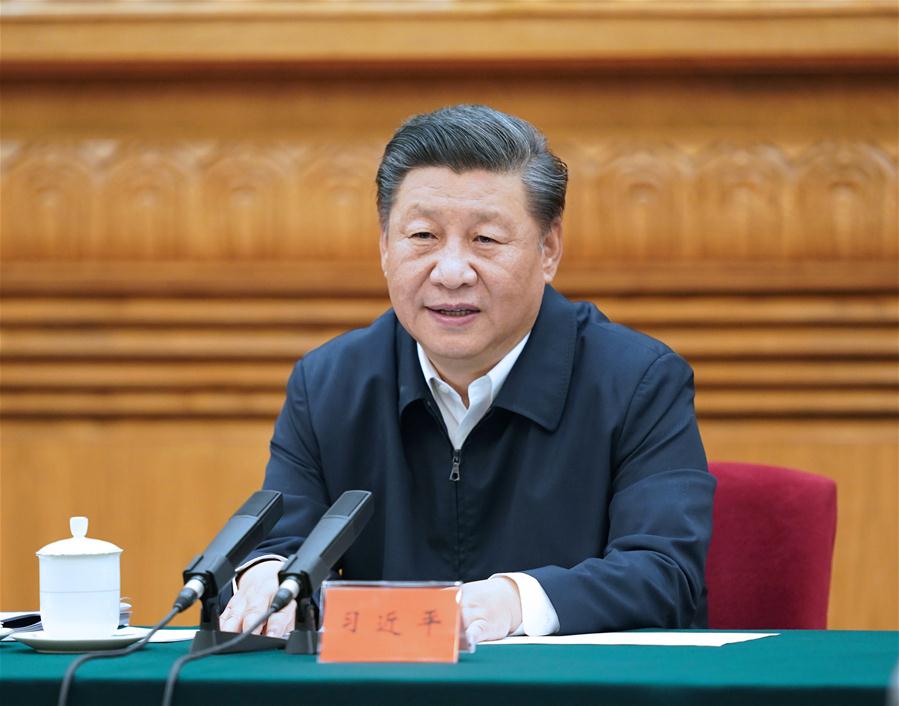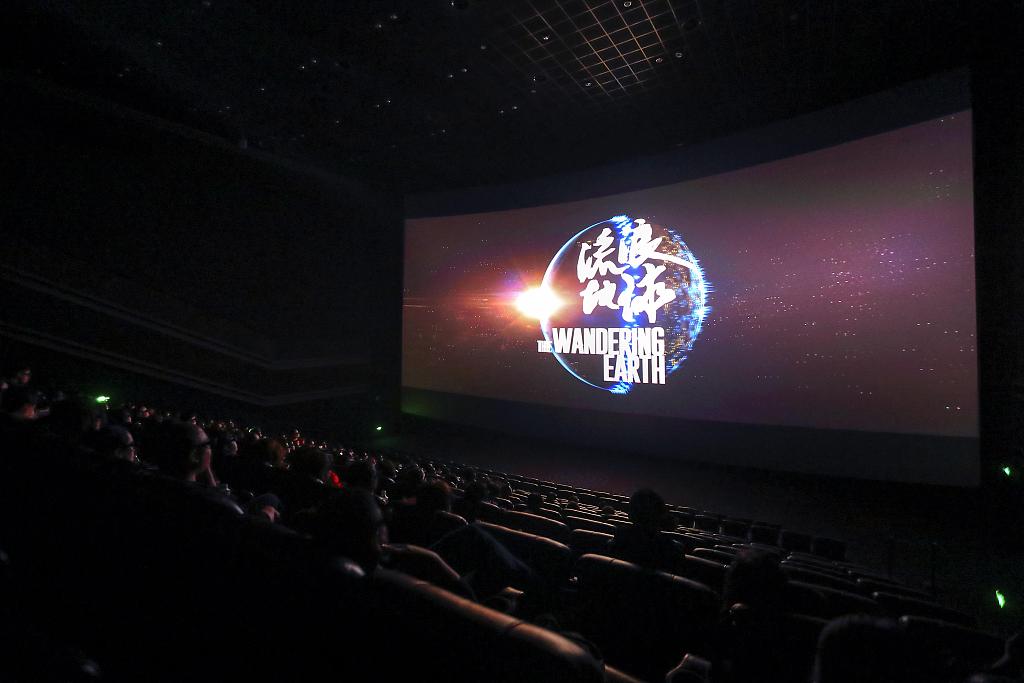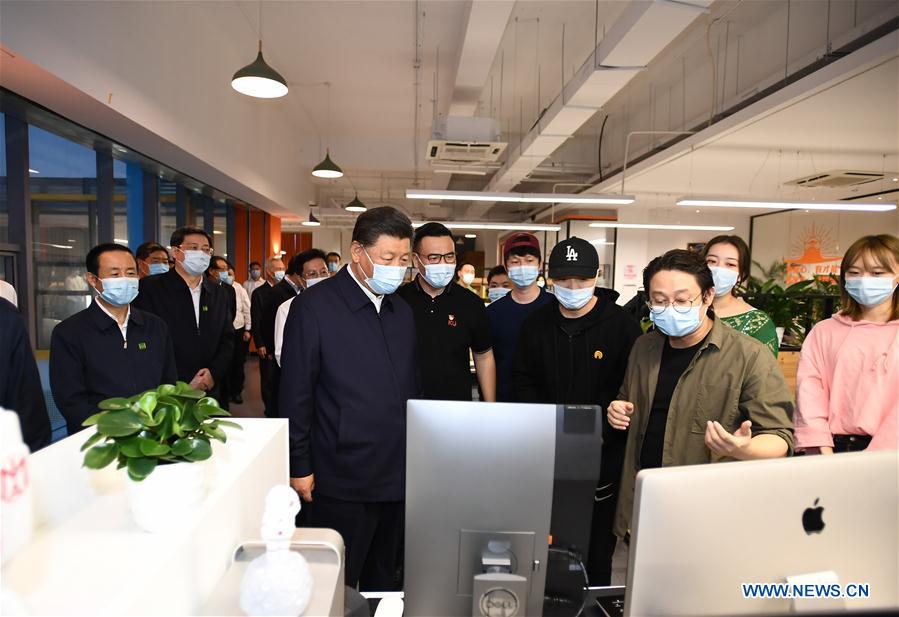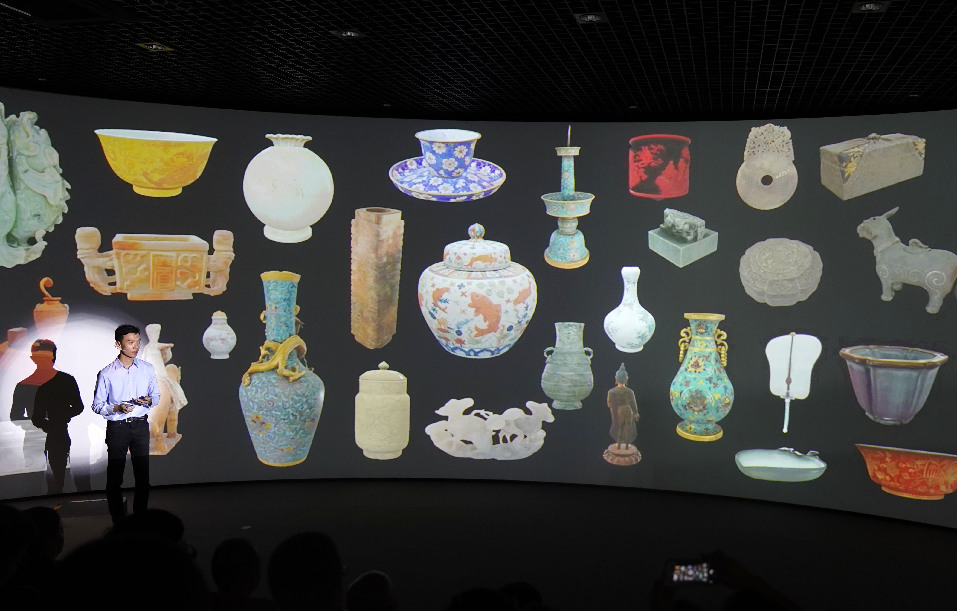China's 13th Five-Year Plan period (2016-2020) has been characterized as a decisive stage in building a moderately prosperous society and a critical period for the facilitation of cultural prosperity.
Comprehensive progress has reportedly been made in China's cultural industry. The last four years have seen a surge in cultural works and an upsizing of cultural companies amid market restructuring and new growth points.

Chinese President Xi Jinping, also general secretary of the Communist Party of China (CPC) Central Committee and chairman of the Central Military Commission, presides over a symposium attended by experts or representatives from China's education, culture, health and sports sectors in Beijing, capital of China, on Sept. 22, 2020. Xi made remarks at the symposium to solicit opinions on the economic and social development in the 14th Five-Year Plan period (2021-2025). (Photo: Xinhua)
President Xi Jinping has called for efforts to improve the modern cultural industry and market system, develop market entities, foster new cultural business and cultural consumption patterns, and enhance people's sense of gain and happiness with high-quality cultural works.
Upscaled market
Chinese blockbusters such as Wolf Warrior and The Wandering Earth broke domestic box office records. Reform of the film industry has reportedly created increasing social and economic benefits.

A boy looks at a poster of The Wandering Earth at a cinema in Beijing. (Photo: China Daily)
China has experienced a surge in teleplays, documentaries, broadcasting, animation and online audio-visual products.
Official statistics for 2015-2019 help gauge the industry's economic achievements.
Box office receipts increased 46 percent between 2015 and 2019 to about 64.3 billion yuan ($9.82 billion) and the number of movie screens rose to 67,787, a 122 percent rise.
The year 2019 saw 10.2 billion books published, an increase of 25.9 percent from 2015. Per capita book ownership averaged 7.29 copies in 2019, a 23.4 percent rise from 2015.
The performing arts market was worth 53.8 billion yuan ($8.22 billion) in 2019, up 14.7 percent from 2016.
The cultural industry and its related industries are playing an increasingly important role in China's domestic industrial restructuring and economic growth.

People read books at a bookstore in Hohhot, north China's Inner Mongolia Autonomous Region, May 4, 2020. (Photo: Xinhua)
Top-level design, market entities
The government has sought to optimize the structure and quality of the cultural industry during 2016-2020. China's total volume of books tops the world. New publications have slightly decreased, but reprints rose.
The number of TV series decreased, but their quality reportedly increased. Domestic movies gained in popularity.
Government design, policies and regulations have framed and driven industrial restructuring and development.
A successful cultural industry depends on the cultivation of cultural companies and entities.

Photo: VCG
China Film Company and Shanghai Film Company went public at the Shanghai Stock Exchange and landed on the A-share market in August 2016, marking a milestone in the restructuring of state-owned cultural enterprises.
The cultural industry demands a flexible industrial structure. Thanks to lowered thresholds to industry access, private and mixed-ownership enterprises have expanded to dominate the cultural industry through rapid listing, mergers and acquisitions during the 13th Five-Year Plan period.
Market evaluation
Radio and television program ratings underwent a comprehensive big data reevaluation that went into trial operation at the end of 2018.
Where traditional ratings are more based on sample households, the comprehensive big data cloud ratings are more intended to address the problem of false ratings and provide more accurate audience data.

Chinese President Xi Jinping, also general secretary of the Communist Party of China Central Committee and chairman of the Central Military Commission, visits a cultural industry park to learn about the development of cultural industry, in Changsha, capital of central China's Hunan Province, Sept. 17, 2020. Xi on Thursday inspected Changsha. (Photo: Xinhua)
The government has sought to improve the evaluation and motivation of the cultural industry, ensure a fair market and strengthen supervision of the commercial performance market.
Online bookstores and online publication trading platforms have received extra supervision and management in line with the E-Commerce Law of the People's Republic of China.
Online culture
The online cultural industry has been upgraded and transformed over the last four years. For example, most movie tickets are now bought online: an audience member simply buys the movie seat ticket in advance by mobile phone.
Gradual changes have also taken place in book sales, with the proportion of online purchases increasing year by year. The scale of the online literature market continues to grow and the number of registered users is growing.

A staff member introduces digital Palace Museum at the Palace Museum in Beijing, capital of China, July 16, 2019. (Photo: Xinhua)
Virtual cultural projects surged during the COVID-19 pandemic: Cloud performances, museums, recordings, tourism, concerts and forums have revolutionized traditional models of cultural consumption.
An "internet + culture" operating model has revitalized the traditional cultural industry. For example, the Forbidden City launched its "VR Forbidden City" and "Panoramic Forbidden City" products. The Dunhuang Research Institute launched "Digital Dunhuang" and "Virtual Dunhuang."
Online viewers have surged every year for new audio-visual media. Online video viewers hit 888 million in June 2020, or 94.5 percent of all internet users, according to data from the China Internet Network Information Center. They watched short videos, online drama, movies, shows and other cultural products.
The improving content of the online audio-visual industry has ushered in a new copyright situation as increasing numbers of users pay to consume at major online audio-visual platforms.
Paid membership has become the main revenue of video websites, with awareness of copyright reportedly strengthening day by day.

Li Meng, an online influencer, introduces local walnuts via livestreaming in Danfeng county, Shangluo, Northwest China's Shaanxi province, July 20, 2020. (Photos: Xinhua)
Webcasts are the new growth drivers of the cultural industry. The number of live webcast viewers reached 562 million in June 2020, or 59.8 percent of total internet users, according to China Internet Network Information Center data.
There were 309 million live e-commerce broadcast viewers, or 32.9 percent of all internet users. A surge in e-commerce live broadcasting has stimulated shopping demand, created new consumption patterns and alleviated poverty.
(Translated by Jiang Zhuhan and Qiu Qingyi; Edited by Huang Jingjing)


